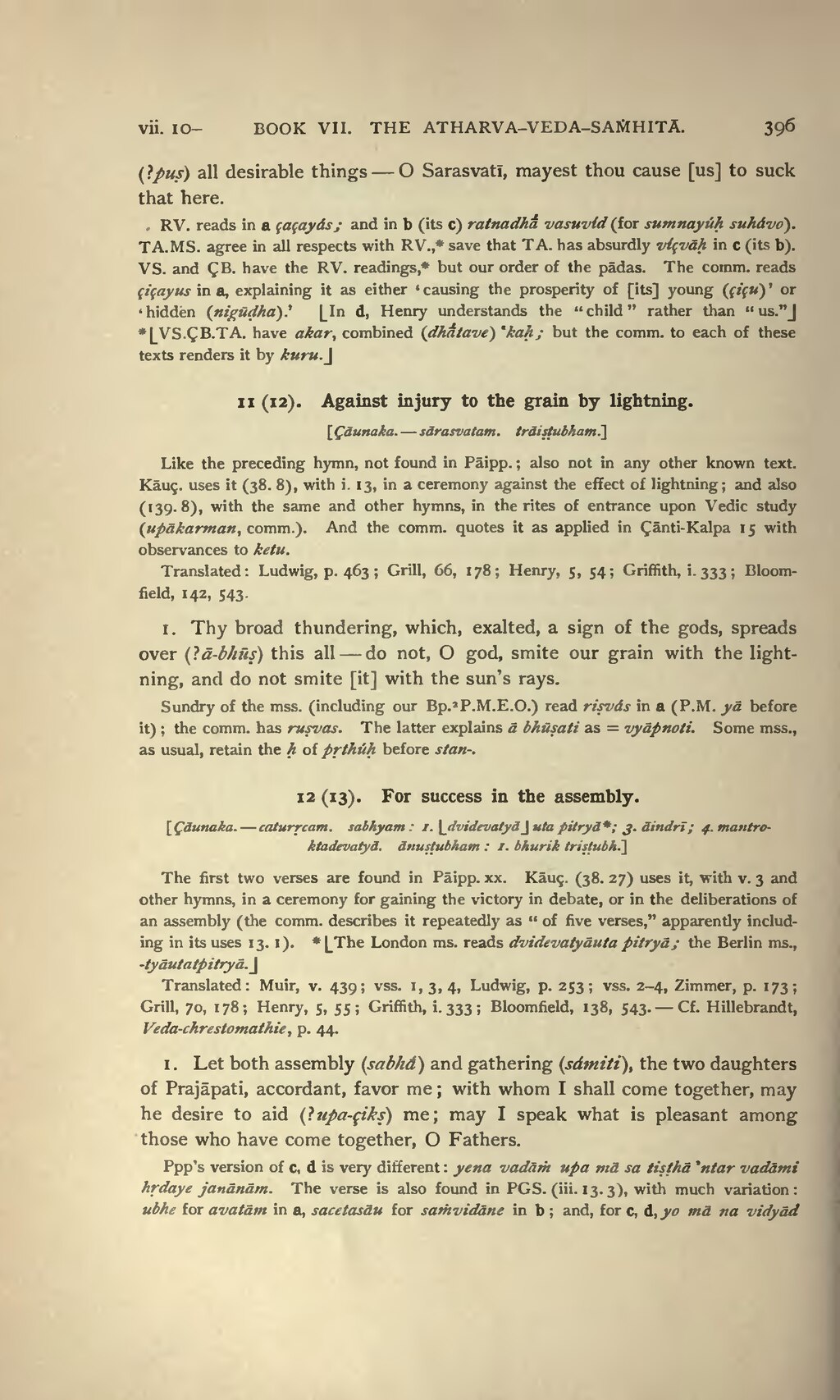(? puṣ) all desirable things—O Sarasvatī, mayest thou cause [us] to suck that here.
RV. reads in a çaçayás; and in b (its c) ratnadhā́ vasuvíd (for sumnayúḥ suhávo). TA.MS. agree in all respects with RV.,* save that TA. has absurdly víçvāḥ in c (its b). VS. and ÇB. have the RV. readings,* but our order of the pādas. The comm. reads çiçayus in a, explaining it as either 'causing the prosperity of [its] young (çiçu)' or 'hidden (nigūḍha).' ⌊In d, Henry understands the "child" rather than "us."⌋ *⌊VS.ÇB.TA. have akar, combined (dhā́tave) ‘kaḥ; but the comm. to each of these texts renders it by kuru.⌋
11 (12). Against injury to the grain by lightning.
[Cāunaka.—sārasvatam. trāiṣṭubham.]
Like the preceding hymn, not found in Pāipp.; also not in any other known text. Kāuç. uses it (38. 8), with i. 13, in a ceremony against the effect of lightning; and also (139. 8), with the same and other hymns, in the rites of entrance upon Vedic study (upākarman, comm.). And the comm. quotes it as applied in Çānti-Kalpa 15 with observances to ketu.
Translated: Ludwig, p. 463; Grill, 66, 178; Henry, 5, 54; Griffith, i. 333; Bloomfield, 142, 543.
1. Thy broad thundering, which, exalted, a sign of the gods, spreads over (? ā-bhūṣ) this all—do not, O god, smite our grain with the lightning, and do not smite [it] with the sun's rays.
Sundry of the mss. (including our Bp.2P.M.E.O.) read riṣvás in a (P.M. yā before it); the comm. has ruṣvas. The latter explains ā bhūṣati as = vyāpnoti. Some mss., as usual, retain the ḥ of pṛthúḥ before stan-.
12 (13). For success in the assembly.
[Çāunaka.—caturṛcam. sabhyam: 1. ⌊dvidevatyā⌋ uta pitryā*; 3. āindrī; 4. mantroktadevatyā. anuṣṭubham: 1. bhurik triṣṭubh.]
The first two verses are found in Pāipp. xx. Kāuç. (38. 27) uses it, with v. 3 and other hymns, in a ceremony for gaining the victory in debate, or in the deliberations of an assembly (the comm. describes it repeatedly as "of five verses," apparently including in its uses 13. 1). *⌊The London ms. reads dvidevatyāuta pitryā; the Berlin ms., -tyāutatpitryā.⌋
Translated: Muir, v. 439; vss. 1, 3, 4, Ludwig, p. 253; vss. 2-4, Zimmer, p. 173; Grill, 70, 178; Henry, 5, 55; Griffith, i. 333; Bloomlield, 138, 543.—Cf. Hillebrandt, Veda-chrestomathie, p. 44.
1. Let both assembly (sabhā́) and gathering (sámiti), the two daughters of Prajāpati, accordant, favor me; with whom I shall come together, may he desire to aid (? upa-çikṣ) me; may I speak what is pleasant among those who have come together, O Fathers.
